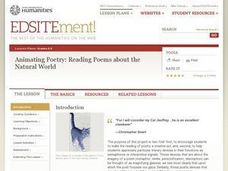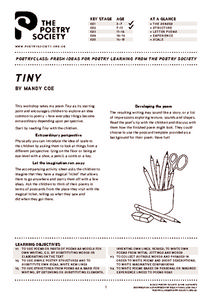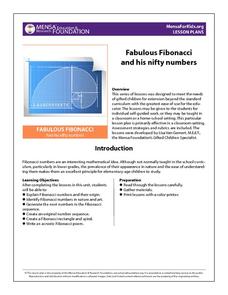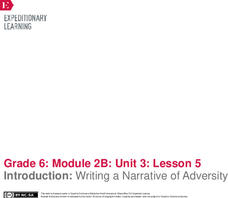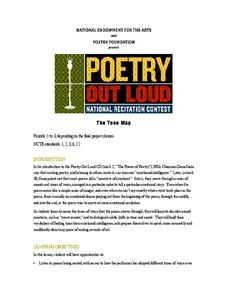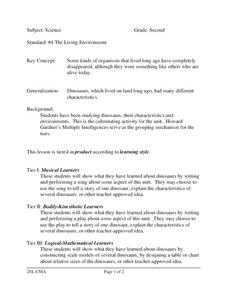National Endowment for the Humanities
Animating Poetry: Reading Poems about the Natural World
Students complete poetry analysis activities. In this poetry analysis instructional activity, students consider the use of imagery and sound devices in poetry. Students translate poetry into another art, read a diverse selection of...
Curated OER
Ho Ho Poetry
Students read about the sights and sounds of a Las Vegas Christmas. They use words and phrases taken from articles in a recent issue of the New York Times to create a holiday-themed "found Poem."
Curated OER
Creative Writing
Students determine what grammar is and how they have learned it. In this creative writing lesson, students read "Style' Gets New Elements," and respond to the discussion questions. Students then present grammatical rules to one another...
Poetry Society
Tiny by Mandy Coe
Introduce magic and imagination into your classroom with a poetry activity. Learners read the poem "Tiny" by Mandy Coe and use their magic tickets to visit any place they can think of! The final result is a poem describing where they...
Crafting Freedom
George Moses Horton: Slavery from a Poet's Perspective
Pupils have the unique opportunity to learn about the institution of slavery by reading first-hand experiences as described by George Moses Horton, the first slave to publish anti-slavery poetry.
Curated OER
My Antonia: Biopoem Writing Strategy
Explore the characters in My Antonia by Willa Cather with a biopoem assignment. Pupils use the provided format to write their poems about any character from the book.
MENSA Education & Research Foundation
Fabulous Fibonacci and His Nifty Numbers
Fibonacci numbers are not only found in the classroom but also in nature. Explore the concept of Fibonacci numbers through a series of lessons designed to gain insight into the mathematical reasoning behind the number pattern, and spark...
EngageNY
Writing the Final Narrative: Monologue or Concrete Poem
Get inspired to help those creative juices flow. Using the resource, scholars write their final, best version of their narrative monologues or concrete poems. Next, they prepare for a performance task by watching and discussing a video...
K20 LEARN
Diggin' Deeper - Poetry Made Relevant: Poetry And Poetic Devices
What do Beethoven, Bob Dylan, and Pharrell all have in common? Works by these three musicians are used to launch a study of poetry. Class members listen to passages from the music and craft a quick write about how the music makes them...
K20 LEARN
Texture Poetry: The Great Gatsby and the Sense of Touch
To prepare for crafting a descriptive poem about a character in F. Scot Fitzgerald's The Great Gatsby, groups describe the texture of objects hidden in small bags. Individuals then select a character from the novel and an object...
EngageNY
Introduction: Writing a Narrative of Adversity
A little adversity is good for writing. Scholars review narrative-based monologues and concrete poems and choose which genre to use to express their own theme of adversity. Pupils also consider how to structure their narratives by...
K20 LEARN
Sweet and Savory Writing: Descriptive Writing
The engagement is in the details. Young scholars learn the benefit of weaving descriptive and sensory details into the fabric of their writing through the activities in this lesson. As their hands explore items concealed in bags, a...
Curated OER
The Imagine Poetry & Mural Lesson
Readers of all ages can work together in groups to create original poetry on the theme of "Imagine," inspired by John Lennon's classic song. They also create a mural to illustrate their poetry. A beautiful activity, inspired by a...
Curated OER
The Tone Map
Poems are meant to be heard. Hearing a poem being read enriches one’s understanding of the tone and mood of the piece. Introduce your class to the sounds of poetry with a packet that not only details how to use poetry recordings in the...
Curated OER
War Literature
Working in groups, young historians review a war poem written by Stephen Crane. After reviewing the poem, they present an oral interpretation of the poem and hold a panel discussion about their analysis. The panel is made up of five or...
Curated OER
Goals and Perseverance
Define the word perseverance to have learners understand why it is important in reaching goals. Young scholars research how Martin Luther King needed perseverance to accomplish his goals. They write acrostic poems using the word...
Curated OER
Exploring Race Through Literature
Provide your class with an opportunity to examine race through a variety of literary works. They read and analyze a chosen poem, interview, speech, or story describing race in America. They then use key words from the original work to...
Curated OER
Lesson: Paul Chan: 1st Light and 5th Light
Paul Chan's latest exhibit includes seven manifestations of light. Today, kids analyze the pieces 1st Light and 5th Light. They consider the concept of opposed or dualistic realities found in literature, society, and Chan's work. They...
Curated OER
Ben Franklin Timeline
Celebrate inventions such as lightning rods, bifocals, and stoves with a Ben Franklin Day. Young historians conduct research and write a paragraph about an accomplishment of Benjamin Franklin including an illustration or collage that...
Curated OER
Magazine Production
Analyze magazines as a class, looking carefully for the target audience, advertisements, and topics presented. Small groups then work as a publication team and receive a magazine that they have to "sell." Each individual has a different...
Curated OER
Introduction to the Poetry Unit
Learners explore, analyze and interpret one form of poetry writing called Poetry Slam. They hear several examples of unexpected poetry and view a video of "Slam Nation." The books, "Hey You! C'mere: A Poetry Slam," by Elizabeth Swados...
Curated OER
Bio-Poems and U.S. History
Students explore U.S. History by writing poems. For this United States leader biography lesson, students identify elements needed to create a good poem, and write a Bio-Poem about themselves. Students utilize the same form to write a...
Curated OER
The Living Environment
In this reading comprehension lesson, 2nd graders have the choice between musical, kinesthetic, logical mathematical and verbal linguistic options to display their knowledge. Students can write a song, perform a play, construct a model...
Curated OER
Acrostic Poem: June
In this June worksheet, students write an acrostic poem about the month of June. Students begin each line with a word or phrase that starts with the letter on that line.
Other popular searches
- Writing Poetry Onomatopoeia
- Writing Poetry Third Grade
- Writing Poetry and Prose
- Creative Writing Poetry
- Writing Poetry Rhyming Poems
- Descriptive Writing/poetry
- Writing Poetry Unit
- Writing Poetry Lesson Plans
- Poetry Writing Workshop
- Writing Concrete Poetry
- Writing Poetry On
- Teaching Poetry Writing


